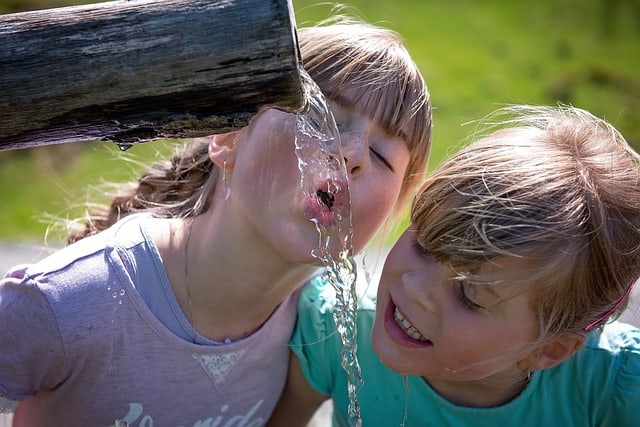Fluoride in the water supply has been a critical part of public health policy. Tooth decay rates have declined substantially. Only a few short decades ago, millions of children had to deal with root canals, large numbers of cavities, and further health problems from their bad dental hygiene. Simply adding a small amount of fluoride into the city reservoir has drastically decreased all of these problems without significant side effects. The addition of fluoride in brushing, and the emphasis on regular brushing, have also reduced these figures of tooth decay.
If our Water Supply is Fluoridated, Should my Child also use a Flouride Toothpaste?…
Fluoride has become so well-known that some people have started to wonder whether it is healthy in high doses from both brushing and the city reservoir. They are further scared by the recommendation on toothpaste containers that small children either receive a small amount or none at all. These considerations are nothing to worry about. In almost all cases, fluoride from brushing and the city reservoir are both incredibly helpful, healthy aspects of an effective dental health care regime.
The Need for Fluoride
The extra source of fluoride from city reservoirs does not mean that an individual should not use fluoridated toothpaste. Fluoride that has been drunk cannot act on the teeth for very long. It does not receive its benefits from ingestion but instead from being immersed around the teeth. Since people usually drink quickly, the benefits only occur for a few seconds at a time. The amount can be less if a person only drinks from the tap for a limited amount of the time.
Brushing a person’s teeth twice a day helps clear plaque and decrease the risk for gum diseases like gingivitis. The brushing power comes partially from the abrasives that are in the paste. Abrasives help to scrape away plaque and tartar from teeth. This plaque and tartar break down tooth enamel through the process of fermentation of sugars and other foods that a person eats on a regular basis.
Enamel is made out of minerals. Fluoride in the mouth causes a chemical reaction that replaces some of the minerals that were lost through the buildup of plaque and tartar. Having fluoride in the mouth can reverse the decrease of enamel and even build it back up over time and may make the enamel even stronger. The addition of fluoride in paste and fluoride in city reservoirs helps improve these effects for most children.
Possible Substitutes
There are some types of toothpaste that do not contain fluoride. Other ingredients that may be prominent are xylitol and green tea extract. Xylitol is a replacement for sugar that adds to the flavor of the product and helps provide its texture. Green tea extract may have antibacterial properties that help to break down tartar and plaque. Breaking down tartar and plaque helps teeth reduce the amount of enamel breakdown that occurs from the daily process of eating.
While these substitutes are favored by many people in the natural foods industry, they are not an adequate substitute for people who can otherwise take fluoride. They may be nearly adequate for people who are allergic or extremely sensitive. However, many of these substitutes cannot replace the enamel. The teeth and providing an abrasive is not enough. The damage from eating and tooth decay will happen regardless.
Children should limit the amount of fluoride from brushing that they use on a regular basis. This is especially true for children below the age of six. These children have to be careful not to take in too much fluoride. An excess of fluoride creates a condition where the teeth will have white stains or streaks. A pea-sized amount of paste is recommended for children under the age of six. Parents should worry more about their children’s health and not receiving enough fluoride than about excess fluoride, however.
Alternatives
These guidelines should not apply to a water supply that is not fluoridated. For instance, millions of American households have wells that are not fluoridated. In those cases, simply gaining fluoride from brushing is not enough. There is a considerable chance that a person can develop tooth decay more than other individuals who do receive fluoride from their taps.
Lastly, some companies provide a fluoride additive that can help give the benefits of fluoride to their wells. In other instances, an individual can take fluoride supplements. This case is even true for children. Governments over the past 70 years have perfected the amount of fluoride that needs to be in the diet of the average American. Anything less than that amount puts the teeth of children and other individuals at risk.
Fluoride and Orthodontics
Brushing with fluoride is not only applicable to children with straight teeth and their dentists. It can also be helpful for children who have orthodontics and those who do not. Brushing is imperative to keep teeth healthy and braces clean. Braces and other orthodontic tools have the possibility of catching food and exacerbating the problem of tooth decay.
A child who has braces will have already have their permanent teeth. This means that they will have no restrictions to consuming fluoride from brushing. Children who have orthodontics need to make sure that they are brushing and drinking a considerable amount from the tap. Tooth decay and associated medical procedures can be much more difficult if a dentist has to work around a palate expander or a set of braces.
Conclusion
Accordingly, parents are worried about any chemical substance given to children. Fluoride may seem strange and odd as an additive into city reservoirs. However, children often eat and drink different minerals. Fluoride is another mineral that is essential to a child’s health. Unlike some minerals, fluoride is incredibly difficult to take into high quantity for children. Therefore, parents should embrace fluoride as the public health success that it has been over the past 70 years. Dr. Engel can answer any questions on this or any pedriatric dental issue.
Contact us today to see why we do what we do.
KinderSmiles Pediatric Dentistry and Orthodontics
400 Kinderkamack Rd.
Oradell, NJ 07649
Phone: 551-210-4012
Fluoridated Water and Your Child’s Toothpaste [2018]



